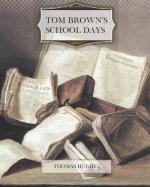“Now, Harry,” said Tom, “no more chaff. I’m serious. Look here. This is what makes my blood tingle.” And he turned over the pages of his Bible and read, “Shadrach, Meshach, and Abed-nego answered and said to the king, O Nebuchadnezzar, we are not careful to answer thee in this matter. If it be so, our God whom we serve is able to deliver us from the burning fiery furnace, and he will deliver us out of thine hand, O king. But if not, be it known unto thee, O king, that we will not serve thy gods, nor worship the golden image which thou hast set up.” He read the last verse twice, emphasizing the nots, and dwelling on them as if they gave him actual pleasure, and were hard to part with.
They were silent a minute, and then Arthur said, “Yes, that’s a glorious story, but it don’t prove your point, Tom, I think. There are times when there is only one way, and that the highest, and then the men are found to stand in the breach.”
“There’s always a highest way, and it’s always the right one,” said Tom. “How many times has the Doctor told us that in his sermons in the last year, I should like to know?”
“Well, you ain’t going to convince us—is he, Arthur? No Brown compromise to-night,” said East, looking at his watch. “But it’s past eight, and we must go to first lesson. What a bore!”
So they took down their books and fell to work; but Arthur didn’t forget, and thought long and often over the conversation.
CHAPTER III—ARTHUR MAKES A FRIEND.
“Let Nature be
your teacher:
Sweet is the lore which
Nature brings.
Our meddling intellect
Misshapes the beauteous
forms of things.
We murder to dissect.
Enough of Science and
of Art:
Close up those barren
leaves;
Come forth, and bring
with you a heart
That watches and receives.”—Wordsworth.
About six weeks after the beginning of the half, as Tom and Arthur were sitting one night before supper beginning their verses, Arthur suddenly stopped, and looked up, and said, “Tom, do you know anything of Martin?”
“Yes,” said Tom, taking his hand out of his back hair, and delighted to throw his Gradus ad Parnassum on to the sofa; “I know him pretty well. He’s a very good fellow, but as mad as a hatter. He’s called Madman, you know. And never was such a fellow for getting all sorts of rum things about him. He tamed two snakes last half, and used to carry them about in his pocket; and I’ll be bound he’s got some hedgehogs and rats in his cupboard now, and no one knows what besides.”
“I should like very much to know him,” said Arthur; “he was next to me in the form to-day, and he’d lost his book and looked over mine, and he seemed so kind and gentle that I liked him very much.”
“Ah, poor old Madman, he’s always losing his books,” said Tom, “and getting called up and floored because he hasn’t got them.”




